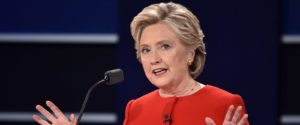by WorldTribune Staff, September 29, 2016
Hillary Clinton’s claims that on her watch as secretary of state Iran was “weeks away” from building a nuclear weapon and was building “covert facilities” were false, analysts say.
“With respect to Iran, when I became secretary of state, Iran was weeks away from having enough nuclear material to form a bomb,” Clinton said during the first presidential debate with GOP candidate Donald Trump.

“They had mastered the nuclear fuel cycle under the Bush administration. They had built covert facilities. They had stocked them with centrifuges that were whirling away.”
Iran has never been “weeks away” from having a nuclear weapon. “U.S. intelligence agencies (and even Israeli ones) have repeatedly confirmed that Iran was not moving to build a bomb — and that includes when Clinton became secretary of state,” the Think Progress website said on Sept. 28.
Analysts say the Democratic nominee asserted that Iran’s nuclear program was growing rapidly in order to tout her alleged achievements with regards to the Iran nuclear agreement which was reached last July.
Negotiations on the deal, however, began long after she left the State Department.
“I spent a year and a half putting together a coalition that included Russia and China to impose the toughest sanctions on Iran,” Clinton said during the debate. “And we did drive them to the negotiating table and my successor, John Kerry, and President Obama got a deal that put a lid on Iran’s nuclear program. Without firing a single shot. That’s diplomacy.”
According to Al-Monitor: “The sanctions Clinton worked so hard to bring about were not what brought Iran to the negotiating table. Iran had been at the negotiating table for quite some time — including before the sanctions Clinton worked to pass in the United Nations in 2010.”
Political analyst Nima Shirazi noted that “the real diplomatic breakthrough came when the United States stopped trying to prevent Iran from enriching any uranium — something that isn’t currently banned under the Nuclear Non-Proliferation Treaty (NPT), of which Iran is a signatory.”
Think Progress noted that: “Even if sanctions were what brought Iran to the negotiating table, and made the Iranian nuclear agreement possible, Clinton also called for more sanctions the same day that the deal went into effect.”
